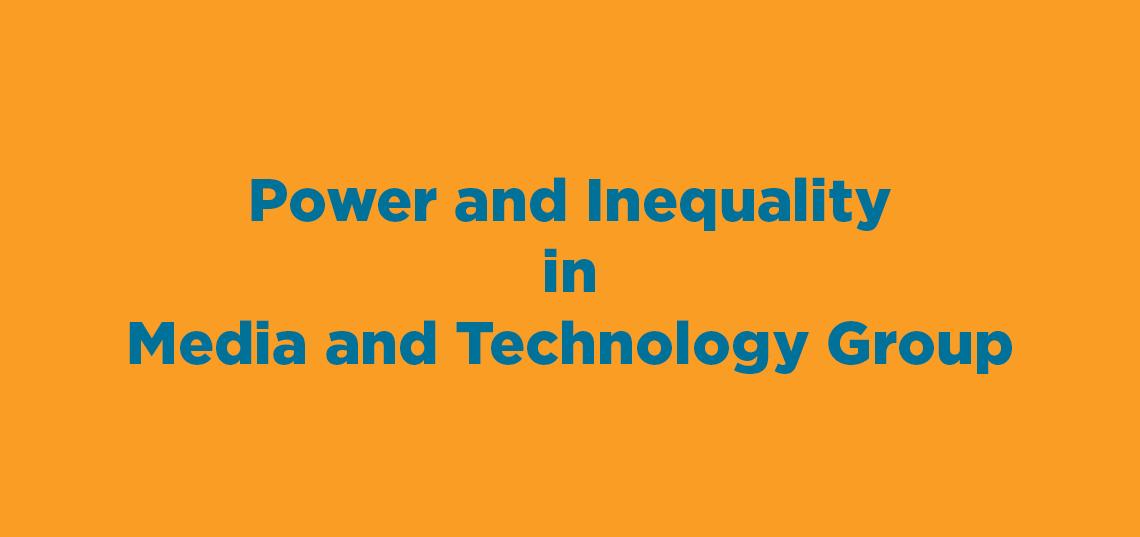
How are SC&I faculty, staff, and doctoral students in the communication, journalism and media studies, library science, and information fields collectively addressing issues of power and inequality through their research, teaching, and other work?
To explore these issues, SC&I faculty members Britt Paris and Khadijah White have launched a new research group named the Power and Inequality in Media and Technology Group. The group’s broad goals are to generate and supportwork on issues of power and inequality in media and technology, create community within SC&I in this space, share skills and knowledge, and building meaningful cross-departmental collaborations.
Paris and White first discussed the idea of forming a research group to discuss race and media in early 2019, and then decided to formally launch it in response to a call for proposals for new research entities from SC&I’s Dean for Research Mark Aakhus.
Aiming to achieve the group’s goals though monthly informal peer review and feedback sessions where participants can share research trajectories and questions, the group has held two meetings so far, and they plan to convene again in April 2020 using Zoom if meeting in person is still not possible due to COVID-19.
At the first meeting, Paris and White were joined by faculty, emeritus faculty, and one staff member. Members of the current core group are staff member Veronica Armour and faculty members Emil Lawrence, Dafna Lemish, John Pavlik, Rebecca Reynolds, and Jorge Reina Schement. For the second meeting, they expanded the group to include SC&I doctoral students.
Explaining the origins of the idea for the group, White said, “When I first came to SC&I, I learned about the Social Media Cluster Mary Chayko set up, and I thought it was a great idea. So when Mark Aakhus put out the call to think of possible new research entities at the school, I thought establishing a research group on power and inequality would be a great opportunity to learn more about what my colleagues are working on in the space, to see if there are ways to bring our different strengths together, and also figure out what we can learn together. So that’s what the group aims to do.
“This semester we asked the deans if we could meet over a meal, because I think it helps make the space more welcoming, and it makes people feel more comfortable and more at home. I am so glad that the deans were willing to support that. We also opened up the last meeting to doctoral students as well who want to work with faculty members they haven’t had the chance to meet or talk to yet. It’s a space that makes us feel more connected – being a scholar can feel really isolating. Once you are out of graduate school you don’t have much time to engage with others around your own work. Conferences are supposed to be places to share your research, but even at conferences the amount of time you have for discussion and thoughtful engagement is really limited.”
Paris said the group provides her with a great opportunity to get to know and work with the entire SC&I academic community. “As a new faculty member in the Library and Information Science Department who has significant overlaps with both the Communication and Journalism and Media Studies departments, I have been excited to get to know my colleagues in these departments within SC&I. In all of my work, I have found it very useful to build collaboration and I was looking for ways to make this happen in SC&I. I was a fan of Khadijah's work prior to this collaboration with her. When she suggested a research or working group on race and media at a Fall 2019 SC&I meeting, I talked with her afterward. The idea for the working group has grown from there. My research postdoc at Data & Society Research Institute in New York City was predicated on collaboration and network building, and I thought I could take some of the lessons I learned there and apply them here.”
Within the group, Paris said, she is working through a project on mis-/disinformation that travels through encrypted networks with an eye towards political and economic influences contributing to this phenomenon.
White said she will discuss with the group her project that recently received funding from the Whiting Foundation. Titled “Security, Trauma, and Schools: A Film-Centered Community Dialogue,” through this project, the Whiting Foundation explained, White will “explore media coverage of school shootings and the human consequence of lockdown culture. White will produce short films featuring portraits of students, parents, and staff describing their experiences with school security, and will then screen the films in a series of community discussion events. Each event will bring parents, students and community members together with local policy makers from the Board of Education to think deeply about how to balance security with learning and how race intersects with these complex issues.”
Looking ahead to ways the group will expand its contributions in the future, Paris said, “Thinking more long-term, beyond engaging meaningfully with real issues that affect people outside the academy, creating a new research working group also benefits the school, and students both within and outside those in the Ph.D. program. As we build out cutting-edge research projects that address critical contemporary questions, we will hopefully develop funded research opportunities for employment, skill building, publications, and other types of meaningful collaboration for master's and undergraduate students, as well as build community within SC&I.”
More information about faculty research at the Rutgers School of Communication and Information (SC&I) is on the school's website.
